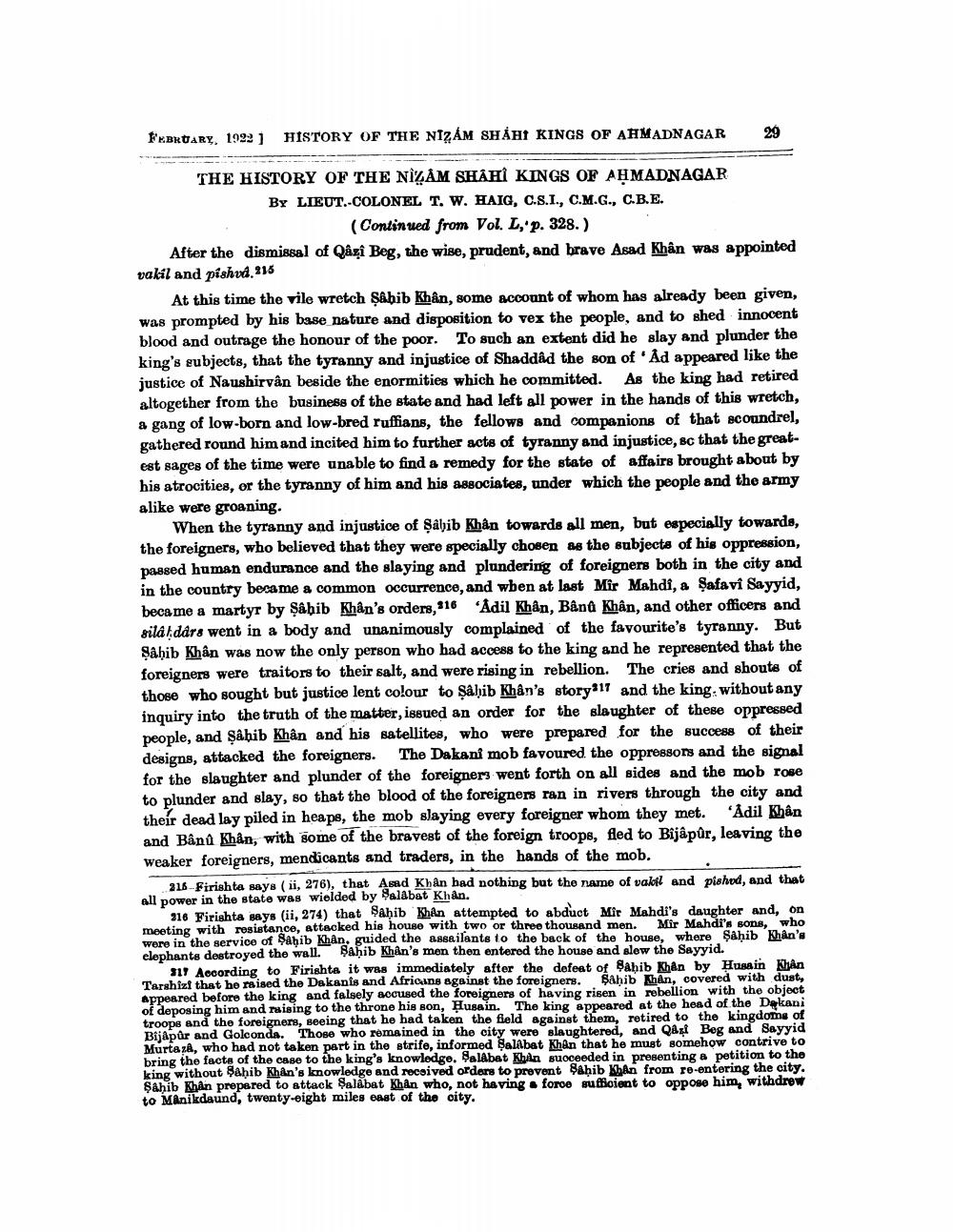________________
D'EBRUARY, 1992) HISTORY OF THE NIZÁM SHÅHI KINGS OF AHMADNAGAR
29
THE HISTORY OF THE NIZAM SHAHI KINGS OF AHMADNAGAR BY LIEUT.-COLONEL T. W. HAIG, C.S.I., C.M.G., C.B.E.
(Continued from Vol. L, p. 328.) After the dismissal of Qazî Beg, the wise, prudent, and brave Asad Khân was appointed vakil and pishvd.215
At this time the vile wretch şahib Khân, some account of whom has already been given, was prompted by his base nature and disposition to vex the people, and to shed innocent blood and outrage the honour of the poor. To such an extent did he slay and plunder the king's subjects, that the tyranny and injustice of Shaddad the son of Ad appeared like the justice of Naushirvan beside the enormities which he committed. As the king had retired altogether from the business of the state and had left all power in the hands of this wretch, & gang of low-born and low-bred ruffians, the fellows and companions of that scoundrel, gathered round him and incited him to further acts of tyranny and injustice, sc that the greatest sages of the time were unable to find a remedy for the state of affairs brought about by his atrocities, or the tyranny of him and his associates, under which the people and the army alike were groaning.
When the tyranny and injustice of Şahib Khân towards all men, but especially towards, the foreigners, who believed that they were specially chosen as the subjects of his oppression, passed human endurance and the slaying and plundering of foreigners both in the city and in the country became a common occurrence, and wben at last Mir Mahdi, a Şafavî Sayyid, became a martyr by Şahib Khan's orders, 316 Adil Khân, Bâng Khân, and other officers and sila dars went in a body and unanimously complained of the favourite's tyranny. But Sahib Khân was now the only person who had access to the king and he represented that the foreigners were traitors to their salt, and were rising in rebellion. The cries and shouts of those who sought but justice lent colour to şahib Khân's storyalt and the king without any inquiry into the truth of the matter, issued an order for the slaughter of these oppressed people, and şahib Khan and his satellites, who were prepared for the success of their designs, attacked the foreigners. The Dakani mob favoured the oppressors and the signal for the slaughter and plunder of the foreigners went forth on all sides and the mob rose to plunder and slay, so that the blood of the foreigners ran in rivers through the city and their dead lay piled in heaps, the mob slaying every foreigner whom they met. 'Adil Khân and Bânů Khân, with some of the bravest of the foreign troops, fled to Bijâpûr, leaving the weaker foreigners, mendicants and traders, in the hands of the mob.
216- Firishta says (ii, 276), that Asad Khân bad nothing but the name of valil and pishod, and that all power in the state was wieldod by Salabat Khan.
316 Firishta says (ii, 274) that Sahib Khan attempted to abduct Mir Mahdi's daughter and, on meeting with resistance, attacked his house with two or three thousand men. Mir Mehdi's sons, who were in the service of Bahib Khan, guided the assailants to the back of the house, where sahib Khan's clephants destroyed the wall. Ahib Khan's men then entered the house and slow the Sayyid.
911 According to Firishta it was immediately after the defeat of Bahib Khân by Husain Nhân Tarshizi that he raised the Dakanis and Africans against the foreigners. Sahib Khan, covered with dust, Appeared before the king and falsely Bocused the foreigners of having risen in rebellion with the object of deposing him and raising to the throne his son, Husain. The king appeared at the head of the Dekani troops and the foreigners, seeing that he had taken the field against them, retired to the kingdoms of Bijapur and Golconda. Those who remained in the city were slaughtered, and Q&z Beg and Sayyid Murtaza, who had not taken part in the strife, informed Salibat Khan that he must somehow contrive to bring the facts of the case to the king's knowledge. SalAbat Khin suoceeded in presenting & petition to the king without Bahib Khân's knowledge and received orders to prevent Sahib Khan from re-entering the city. Sahib Khan prepared to attack Salábat Khan who, not having force suftoient to oppose him, withdrew to Manikdaund, twenty-eight miles east of the city.




